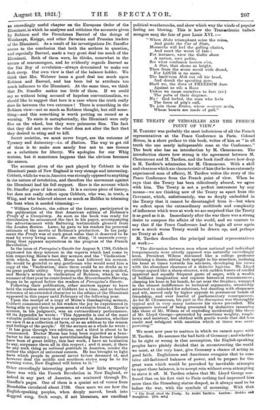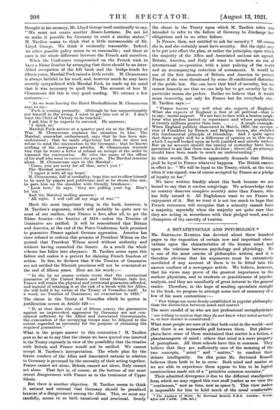1111., TREATY OF VERSAILLES AND THE FRENCH POINT OF VIEW.*
M. Tanta:au was probably the most industrious of all the French representatives at the Peace Conference in Paris. Colonel House, in a short preface to this book, writes of him as " in all
truth the one nearly indispensable man at the Conference." The book also has an introduction by M. Clemenceau. The introduction shows how strong is the agreement between M. Clemenceau and M. Tardieu, and the book itself shows how deep is M. Tardieu's admiration for M. Clemenceau. With a skill and clearness which are characteristic of him (for he is an extremely experienced man of affairs), M. Tardieu writes the story of the Peace Conference from the French point of view. When he
says that the Treaty has been ridiculously abused, we agree with him. The Treaty is not a perfect instrument by any means—we are thinking now of the Treaty as apart from the Covenant, which, unfortunately, was so deeply embedded in the Treaty that it cannot be disentangled from it—but when we reflect upon the extraordinary multitude and complexity of influences which were at work we are surprised that the Treaty is as good as it is. Immediately after the war there was a strong desire to compose the affairs of the world, and we venture to say that if the Peace Conference had to begin all over again now a much worse Treaty would be drawn up, and perhaps no Treaty at all.
M. Tardieu describes the principal national representatives
at work:—
" The discussion between men whose national and individual temperaments were utterly opposed was naturally exceedingly keen. President Wilson discussed like a college professor criticizing a thesis, sitting bolt upright in his armchair, inclining his head at times towards his advisers, developing his views with tho abundant clearness of a didactic logician. Mr. Lloyd George argued like a sharp-shooter, with sudden bursts of cordial approval and equally frequent gusts of anger, with a wealth of brilliant imagination and copious historical reminiscences ; clasping his knee in his hands, he sat near the fireplace, wrapped in the utmost indifference to technical arguments, irresistibly attracted to unlooked-for solutions, but dazzling with eloquence and wit, moved only by higher appeals to permanent bonds of friendship, and ever fearful of parliamentary consequences. As for M. Clemenceau, his part in the discussion was thoroughly typical and in very many instances his views prevailed. His arguments instead of being presented by deductive reasoning like those of Mr. Wilson or of exploding incidentally like those of Mr. Lloyd George—proceeded by assertions weighty, rough- hewn and insistent, but clothed with gentle words that did him credit and refulgent with emotion which at times was over- powering."
We must now pass to matters in which we cannot agree with M. Tardien. He assumes the bad faith of Germany; and whether he be right or wrong in that assumption, the English-speaking
peoples have plainly decided that in reconstructing the world we must, at the very least, .give Germany a chance of acting in
good faith. Englishmen and Americans recognize that to con. trive old-fashioned balances of power, and to prepare for the great wars which would be provoked by inevitable attempts to upset those balances, is to accept ruin without even attempting to stave it off. M. Tardieu relates that Mr. Lloyd George con- fessed that on his first visit to Paris nothing had impressed him
more than the Strassburg statue draped, as it always used to be before the war, with the symbols of mourning. With that
• The Truth about the Treaty. By Andre Tardieu. London: lIodder and Stoughton. Ves. net .,1 thought in his memory, Mr. Lloyd George used continually to say, " We must not create another Alsace-Lorraine. Do not let us make it possible for Germany to erect a similar statue." M. Tardieu seems to think that a little unreasonable of Mr. Lloyd George. We think it eminently reasonable. Indeed, no other possible policy seems to us reasonable ; and there at once is the whole difference between the French and ourselves.
When the Conference compromised on the French wish to have a Rhine frontier by arranging that there should be an inter- Allied occupation of the left bank and the bridge-heads for fifteen years, Marshal Foch raised a little revolt. M. Clemenceau is always faithful to his word, and, however much he may have secretly sympathized with Marshal Foch, he made up his mind that it was necessary to quell him. The account of how M. Clemenceau did this is very good reading. We extract a few sentences :- " As we were leaving the Hotel Bischoffsheim M. Clemenceau says to me :
Foch is coming presently. Although he has unquestionably put himself in the wrong, I want to get him out of it. I don't want the Chief of Victory to be touched.'
I ask him if he expects to succeed. He answers : I think so.'
Marshal Foch arrives at a quarter past six at the Ministry of War. M. Clemenceau explains the situation to him. The Marshal, somewhat embarrassed, says that he has been mis- understood ; that he made objections but that he does not refuse to send the convocation to the Germans ; that he knows nothing of the newspaper articles. M. Clemenceau reminds him that he wrote a letter of refusal on receipt of the order to transmit the convocation. He cites the name of the officer of his staff who went to correct the proofs. The Marshal remains silent. M. Clemenceau says to the Marshal : Come, you are sorry for all that, aren't you ? '
The Marshal answers : ' I regret it with all my heart.'
M. Clemenceau, full of cordiality, begs him not to allow himself to be used by papers and politicians and as he shows him out, he pats him on the shoulder with friendly bruslcness : Look here,' he says, they are pulling your leg. Don't let 'em.'
And the Marshal smiling answers : All right. I will call off my dogs of war.' "
Much the most important thing in the book, however, is M. Tardieu's argument, which will probably be quite new to most of our readers, that France is free, after all, to get the Rhine frontier—the frontier of 1814—unless the Treaties of Guarantee are ratified. It will be remembered that Britain and America, at the end of the Peace Conference, both promised to guarantee France against German aggression. America has since refused to redeem this promise of President Wilson on the ground that President Wilson acted without authority and without having consulted the Senate. As a result the whole scheme has fallen into abeyance. M. Tardieu seizes upon this failure and makes it a pretext for claiming French freedom of action. In fine, he declares that if the Treaties of Guarantee are not raffled the Rhenish provinces will not be evacuated at the end of fifteen years. Here are his words :- " In the by no means certain event that the contractual guarantee of the United States and Great Britain fails her, France will retain the physical and territorial guarantee afforded, and instead of retaining it at the risk of a break with her Allies, she will hold it by virtue of the Treaty of Versailles itself. In a word, no Treaties of Guarantee, no evacuation in 1935."
The clause in the Treaty of Versailles which he quotes in justification occurs in Article 429 :— " If, at that date (the end of fifteen years), the guarantees against an unprovoked aggression by Germany are not con- sidered sufficient by the Allied and Associated Governments, the evacuation of the occupying troops may be delayed to the extent regarded as necessary for the purpose of obtaining the required guarantees."
What is the proper answer to this contention ? M. Tardieu goes so far as to say that the clause we have quoted was inserted in the Treaty expressly in view of the possibility that the treaties with Britain and France would not be ratified. We cannot accept M. Tardieu's interpretation. The whole plan for the future conduct of the Allies and Associated nations in relation to Germany is governed by the necessity of their acting together. France cannot act alone, Britain cannot act alone, Italy cannot act alone. That fact is, of course, at the bottom of our most recent disagreement with France as to the treatment of Upper Silesia.
But there is another objection. M. Tardieu seems to think it natural and rational that Germany should be penalized because of a disagreement among the Allies. This, we must say candidly, seems to us both unnatural and irrationaL Surely the clause in the Treaty upon which M. Tardieu relies wag intended to refer to the failure of Germany to discharge her obligations and to no other failure.
Is France, then, not entitled to ask foi security ? Of course she is, and she certainly must have security. But the right way is to put into effect the plan, or rather the principles, upon which the majority of the Allies and Associated nations are agreed, Britain, America, and Italy all want to introduce an era of international co-operation with, a joint policing of the world and an accompanying reduction of armaments. It would be one of the first interests of Britain and America to protect France if she were threatened by some ill-conditioned disturber of the public law. She can have that kind of security, but we cannot honestly see that we can help her to get security by the particular means she prefers. Rather we believe that it would mean insecurity, not only for France but for everybody else. M. Tardieu says :- " France knows very well what she expects of England. What she expects of England is first of all political—that is to say—moral support. We are face to face with a beaten neigh- bour who prefers hatred to repentance and whose population is twenty millions greater than ours A single example. When England publicly disavowed in March, 1920, the occupa- tion of Frankfort by French and Belgian troops, she violated this fundamental principle of friendship. And I quite agree, that there might well be a difference of opinion as to this step which I myself looked upon as both justified and utterly useless. But on no account should the enemy of yesterday have been permitted to see that there was a division ; above all, an attempt should have been made to reach an understanding."
In other words, M. Tardieu apparently demands that Britain shall be loyal to France whatever happens. The British answer in effect is : " We will be loyal to the Treaty, which, at the time
when it was signed, was of course accepted by France as a pledge of loyalty to her."
We have written frankly about this book because we are bound to say that it excites misgivings. We acknowledge that no country deservea complete security more than France, who has fully earned it. All Englishmen want to see France in
enjoyment of it. But we trust it is not too much to hope that French statesmen will recognize that a minority cannot force a majority, especially when the majority are quite sure that they are acting in accordance with their pledged word, And as champions of the sanctity of treaties.



































 Previous page
Previous page